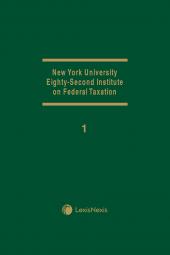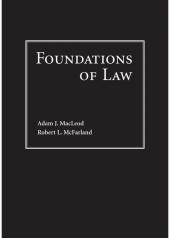Foundations of Law
Select subscription type
Terms & conditions
Subscribers receive the product(s) listed on the Order Form and any Updates made available during the annual subscription period. Shipping and handling fees are not included in the annual price.
Subscribers are advised of the number of Updates that were made to the particular publication the prior year. The number of Updates may vary due to developments in the law and other publishing issues, but subscribers may use this as a rough estimate of future shipments. Subscribers may call Customer Support at 800-833-9844 for additional information.
Subscribers may cancel this subscription by: calling Customer Support at 800-833-9844; emailing customer.support@lexisnexis.com; or returning the invoice marked "CANCEL".
If subscribers cancel within 30 days after the product is ordered or received and return the product at their expense, then they will receive a full credit of the price for the annual subscription.
If subscribers cancel between 31 and 60 days after the invoice date and return the product at their expense, then they will receive a 5/6th credit of the price for the annual subscription. No credit will be given for cancellations more than 60 days after the invoice date. To receive any credit, subscriber must return all product(s) shipped during the year at their expense within the applicable cancellation period listed above.
Subscribers receive the product(s) listed on the Order Form and any Updates made available during the annual subscription period. Shipping and handling fees are not included in the annual price.
Subscribers are advised of the number of Updates that were made to the particular publication the prior year. The number of Updates may vary due to developments in the law and other publishing issues, but subscribers may use this as a rough estimate of future shipments. Subscribers may call Customer Support at 800-833-9844 for additional information.
Subscribers may cancel this subscription by: calling Customer Support at 800-833-9844; emailing customer.support@lexisnexis.com; or returning the invoice marked 'CANCEL'.
If subscribers cancel within 30 days after the product is ordered or received and return the product at their expense, then they will receive a full credit of the price for the annual subscription.
If subscribers cancel between 31 and 60 days after the invoice date and return the product at their expense, then they will receive a 5/6th credit of the price for the annual subscription. No credit will be given for cancellations more than 60 days after the invoice date. To receive any credit, subscriber must return all product(s) shipped during the year at their expense within the applicable cancellation period listed above.
Product description
View a sample of this title using the ReadNow feature
Foundations of Law is designed to help law and pre-law students make sense of law in a changeful age. It is founded upon the conviction of the English jurist William Blackstone that students who intend to study law need both technical instruction in law and liberal education in the history and jurisprudential concepts of law. The book considers the enduring nature of law and its relationship to equity and justice with the assistance of the authors of what we today call the Great Books. It also emphasizes enduring aspects of legal practice: the role of logic; the meaning and importance of conscience and of due process; different approaches to textual interpretation; and the relation of law to other normative concepts (such as morality and religion) and to science (such as economics).
The book surveys classic writings concerning law and justice—for example, the works of Sophocles, Plato, Aristotle, and Aquinas. It contains writings that are foundational to Anglo-American legal norms and institutions—Blackstone, Bentham, Locke, the Federalists, Lincoln, Holmes, and others. It includes helpful analytical insights from influential jurisprudence scholars—Austin, Hart, Hohfeld, Dworkin, and Finnis, among others. Most uniquely, it matches each of those writings with constitutions, declarations, statutes, judicial decisions, and other legal and political texts (even a letter from jail) that illustrate and reinforce the key lessons drawn from the great works. The book does not leave students adrift in abstractions. It provides a solid grounding for understanding and practicing law in a rapidly-changing world.
- Combines technical instruction in law with liberal education in the history and jurisprudential concepts of law.
- Provides a solid grounding in the enduring characteristics of law to enable students to understand and practice law in a rapidly-changing world.
- Surveys the great books concerning law, equity, and justice.
- Uniquely matches each great book excerpt with judicial decisions, statutes, proclamations, and other legal materials to illustrate how foundational concepts recur in contemporary legal norms and institutions and to illustrate and reinforce the key lessons drawn from the great works.
- Emphasizes enduring aspects of legal practice: the role of logic; the meaning and importance of conscience and of due process; different approaches to textual interpretation; and the relation of law to other normative concepts (such as morality and religion) and to science (such as economics).
- Surveys classic writings concerning law and justice—for example, the works of Sophocles, Plato, Aristotle, and Aquinas.
- Surveys writings that are foundational to Anglo-American legal norms and institutions—for example, the works of Blackstone, Bentham, Locke, the Federalists, Lincoln, and Holmes.
- Includes helpful analytical insights from influential jurisprudence scholars—Austin, Hart, Hohfeld, Dworkin, and Finnis, among others.
- Opens each chapter with reading questions to assist beginning students.
- Follows readings with notes to direct more advanced students to additional reading and further lines of inquiry.
epub is protected by Adobe DRM.
eBooks, CDs, downloadable content, and software purchases are noncancelable, nonrefundable and nonreturnable. Click here for more information about LexisNexis eBooks. The eBook versions of this title may feature links to Lexis+® for further legal research options. A valid subscription to Lexis+® is required to access this content.
Related products
-
New!Preorder
 NYU 82nd Institute on Federal Taxation with Consolidated Index and Tables VolumesNew!Estimated: May 24, 2024$2,202.00
NYU 82nd Institute on Federal Taxation with Consolidated Index and Tables VolumesNew!Estimated: May 24, 2024$2,202.00 -
New!Preorder
 NYU 82nd Institute on Federal Taxation with NYU Review of Employee Benefits & Executive CompensationNew!Estimated: May 24, 2024$2,984.00
NYU 82nd Institute on Federal Taxation with NYU Review of Employee Benefits & Executive CompensationNew!Estimated: May 24, 2024$2,984.00 -
New!Preorder
 NYU 82nd Institute on Federal Taxation with NYU Review of Employee Benefits & Executive Compensation and Consolidated Index and Tables VolumesNew!Estimated: May 24, 2024$3,107.00
NYU 82nd Institute on Federal Taxation with NYU Review of Employee Benefits & Executive Compensation and Consolidated Index and Tables VolumesNew!Estimated: May 24, 2024$3,107.00
 Lexis Nexis
Lexis Nexis 
